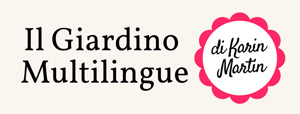Welcome to the Multilingual Garden, dear Jérôme!
Dear Jérôme, would you like to introduce yourself?
My name is Jerome Paul. I’m French. I have been a French language teacher in the Netherlands for 25 years. I am currently working at a Montessori college in Arnhem. My partner is Dutch, and we are the parents of 3 children (2 girls and a boy, from 17 to 23 years). At home, French and Dutch are daily spoken. English is also quite present, because in the Netherlands English is very present on the media (television, music, etc.). The films here are always in the original subtitled version, but we have also been putting the subtitles of the films on Netflix in English, too. My son (17) regularly reads novels in English. Furthermore, I take English conversation classes with Skype.
In addition to my part-time job at school, I developed a blog, ayoutube channel and a podcast. Through my blog: The Français illustré, I offer learners of French (mainly beginner level) educational material, where the illustrations (visual with video, and sound with the podcast) help to understand French. I try to offer the simplest and most natural input possible. The learning process also goes on with the blog, through games, and with the miracles of computing, I can offer interactive games (classical memory, but also sound memory, sound quiz etc.).

What does multilingualism mean to you? Do you consider yourself multilingual?
I don’t really consider myself multilingual, even though I can express myself in three languages, at different levels for each of them, and even though I use at least two of those three languages every day. Maybe I’m multilingual, but I don’t feel it that way, it’s part of my daily life.
A typical day from the point of view of the use of languages in your family/context.
At school, I use Dutch and French. At home, I speak French or Dutch with my partner. But I only speak French with my children. This is the absolute rule (well, except when we are in the company of people who do not understand French). For my blog, I use more and more English.
The positive aspects of your multilingual life and the difficulties you experienced, if any.
At the beginning of my life in the Netherlands, my spoken Dutch was not excellent, and I was not very talkative then. I was also afraid of not using the language properly. Now, even if I still have a French accent and still make mistakes, I speak Dutch fluently. Only writing is still difficult, because I can not always discriminate some sounds, so I have trouble spelling some words correctly. But hey… it does not prevent me from functioning in my Dutch professional life! I started taking English conversation classes and I obtained different qualifications. However, I missed a few opportunities because my oral English was insufficient. But again: that does not stop me from working in the Dutch professional life. I started to take English conversation lessons also because of my work as a freelancer for the International Baccalaureate Organization.
With which languages did your children grow up?
At home, since their birth, I speak French to my three children. Their mother speaks to them in Dutch. As both parents understand both languages, this is not a problem. We live in the Netherlands; the children have their Dutch friends and have gone to Dutch schools. The Dutch input has never been a problem. This makes my children’s Dutch much stronger than their French. And as the natural tendency of human beings is to follow the easiest path, i.e. to only use the language they know better, it was necessary for me to be consistent in giving them French input. My intransigence, my perseverance in speaking only French to my children and demanding that they speak French to me, makes them bilingual.
What is the biggest difficulty in raising multilingual children?
My daughters are now studying. When they were in middle and high school, Dutch and French were part of the curriculum. I taught my children to speak, to understand and to read French, but I never taught them to write it. The French classes at school were too easy for them in terms of oral skills, but they taught them to write (a little bit) their father’s language. This is when I noticed the artificial side of language teaching when it comes to grammar. Grammar has always been almost a handicap for my children who speak French and who did not understand all these “useless” rules (for them, of course). It was even more painful for my older daughter, who is dyslexic. With her dyslexia, she never passed the compulsory grammar and writing tests in French at school. This is really paradoxical, because she speaks French very well, sometimes even better than her teachers!
Have you ever received negative comments regarding your multilingual life?
The bilingualism of my children has never been a problem. French has a good reputation in the Netherlands, even if it is less taught and it seems like people are losing interest in learning it. Even at primary school, with my older daughter, who is dyslexic, this was never a problem, as teachers knew that we spoke French and Dutch at home, which were also the school languages.
What advice would you give to those who live in a situation similar to yours?
In a family where parents speak each other’s languages, my advice is that each parent speaks their language to the children and that they answer them in the language of the parent. You have to be intransigent. You must also know how to control yourself in order not to react negatively if the child speaks to you in the other language.
If in a mixed couple only one language is understood, then I would recommend two things. Firstly, to ensure that the second language is learned (even if only for passive comprehension), so that both languages at home can be used without barriers. Secondly, until your partner can understand your language, take extra time with your children and do as many different activities as possible in your language.
Your children will thank you later for holding on and providing them with a bilingual education. It’s a real treasure!
Where can we find you, if we would like to get in contact with you?
Thank you very much Jérôme for taking the time to answer my questions!
I really appreciated it!





